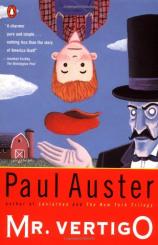About the Book
About the Book
Mr. Vertigo

Critics describe Paul Auster as a storyteller with few modern equals. Auster himself looks to "the anonymous men and women who invented the fairy tales we still tell each other today" as an unending source of inspiration. The debt is clear and welcome in this, his eighth novel, a delight for any reader willing to sit back and give herself up into the hands of a master storyteller. Mr. Vertigo is a genuinely fabulous tale, a page-turner as mythic as the American tall tale and as down-to-earth as a Kansas wheat field, as American as Prohibition and baseball, and as alien as a spiritual quest to conquer gravity itself.
It's the story of Walter Rawley, a wisecracking street urchin from St. Louis who is taken in hand by Master Yehudi, a quasi-religious master who hails from Budapest via Brooklyn. Walt, endearingly described early on by Master Yehudi as a "pus-brained ragamuffin from honky-tonk row," has a hard head, a sharp tongue, and a gift the master has been searching for for years: properly taught, he can levitate. Sometimes cruel, often unnerving, and deeply moving, theirs is one of the most original and unorthodox partnerships in American letters. The story careens between the sublime to the ridiculous, as Master Yehudi and Walt the Wonder Boy take their act on the potholed back roads of the Midwest, their eyes on fame, fortune, and the Great White Way. Walt's reversals of fortune at the hands of his hormones, the Ku Klux Klan, the Chicago mob, and his own perversity are too many to count, and every inch of them entertains and illuminates. To appreciate the precision and cadence of Auster's writing, try reading Mr. Vertigo aloud. Be careful at the very end, where Walt, now an old man looking back, explains how to fly.
Mr. Vertigo
- Publication Date: August 1, 1995
- Paperback: 304 pages
- Publisher: Penguin (Non-Classics)
- ISBN-10: 0140231900
- ISBN-13: 9780140231908



